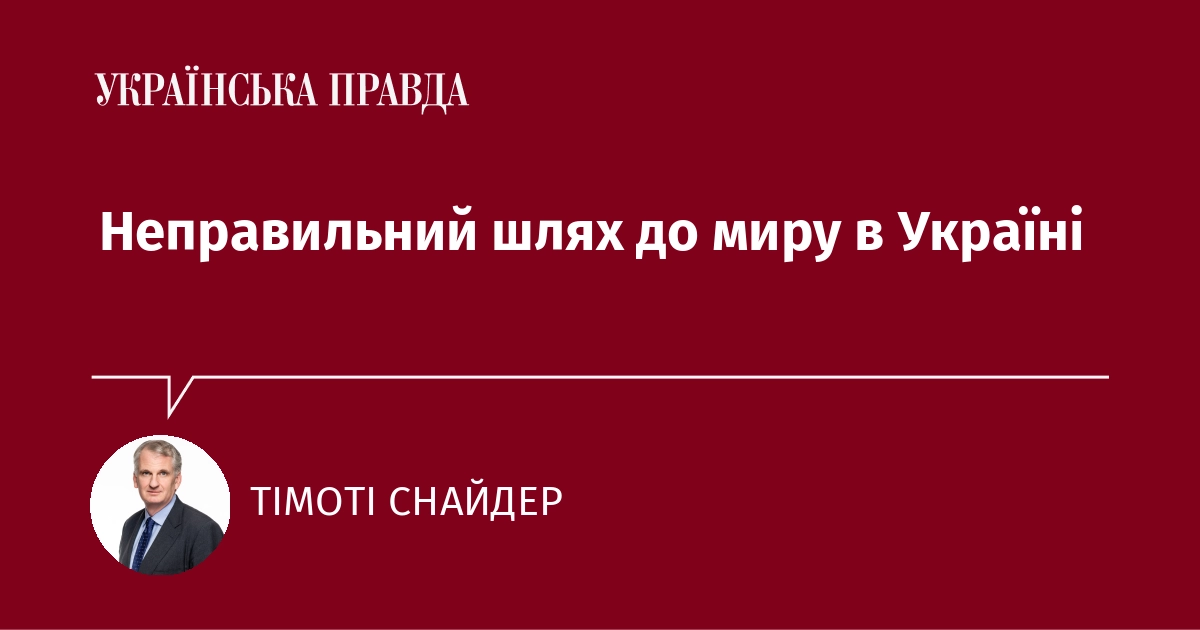“Trump’s “peace plan” increases the risk of nuclear war, destroys the international order and ignores Ukraine.”, — write: www.pravda.com.ua
But this war crime (the latest in a criminal war waged by Russia) has been overshadowed by the news that Russian President Vladimir Putin and US President Donald Trump are secretly settlement negotiations. It is reported that the American special envoy Steve Witkoff (billionaire, real estate developer and cryptocurrency tycoon) and Kirill Dmitriev (head of the Russian National Welfare Fund) became the authors 28-point planwhich is heavily skewed in the interests of the Kremlin. Trump demanded that Ukraine agree to this backroom deal by November 27, though noted also that this may not be the final offer.
Besides the obvious injustice of allowing the aggressor to decide the outcome of the war he started, there are six fundamental problems with this “peace” plan.
Advertising:
First, it increases the risk of nuclear war. If Ukraine is pressured to accept terms tantamount to defeat, the rest of the world will conclude that nuclear weapons are necessary to deter a future invasion by Russia, China, or any other nuclear power. The forced surrender of Ukraine leads to nuclear proliferation and significantly increases the probability of a nuclear Third World War.
Second, this risk is compounded by a second problem with Trump’s peace plan. It is about its consequences for the world order based on the principle of inviolability of state borders. Yes, violations do happen, but they are the exception, not the norm. Endorsing such behavior (and Trump will do so by rewarding Russia for invading Ukraine) is so far out of line that it will shake the entire system. As it stands, the Witkoff-Dmitriev Pact threatens to create a world in which invasions and wars become routine.
Third, giving in to the Kremlin’s long-standing demands will undermine peace and stability in the region. If, under the terms of the settlement, Russia remains stronger than Ukraine, Putin will be in every way – legally, morally, psychologically and economically – inspired to continue the war in Europe.
Fourth, Trump’s plan lacks convincing control mechanisms. Given that Russia has violated every agreement it has ever made with Ukraine, the Kremlin’s assurances that it will not attempt to continue seizing Ukrainian territories make no sense.
America’s security guarantees also lack substance, especially when given by an administration with little concern for honesty and fairness. The only significant tool for deterring new Russian aggression is Ukraine’s accession to NATO, but it is categorically prohibited in the proposed settlement plan.
By prioritizing Russia’s imperial fantasies, rather than the democratic will of Ukraine, Trump’s plan avoids the topic of the country’s post-war reconstruction – and this is the fifth main problem. Peace is not just a temporary absence of hostilities. I am sure that Russia will agree to a ceasefire for several days (perhaps even weeks) in exchange for further surrender of Ukraine. However, real peace means guaranteeing the preservation of Ukraine’s sovereignty and its ability to defend itself, join alliances and, most importantly, recover. The proposed settlement is silent on this, but Ukraine’s allies have put forward absolutely reasonable (and even profitable) plans to restore the country and attract foreign investment.
The last (and probably the most fundamental) problem is the process itself. As history teaches us, achieving a lasting peace settlement requires the participation of all parties involved. Remember how, after World War I, countries that were considered aggressors were excluded from the most important part of the peace negotiations, a decision that ultimately led to World War II.
In the current case, the victims of aggression, the Ukrainians, were not consulted when preparing this peace plan, which looks as if it was dictated by the Russians and translated into English by the Americans. (Perhaps this idea is not as far-fetched as it seems: Witkoff is reportedly using the services of a translator hired by the Kremlin).
The next most important stakeholder – Ukraine’s European allies – was also taken by surprise by Trump’s secret deal. In order to achieve real peace – such that Ukraine is protected and able to recover – all these parties must be at the negotiating table.
Trump’s approaches will not work. When key parties are excluded from the peace process, it is impossible to achieve a full understanding of the relevant issues and gather the necessary information. By excluding Ukraine and its European allies from settlement negotiations, Russia and the US may leave Ukrainians with no choice but to fight. Trump probably believes that he will be able to wash his hands of the Ukrainian issue, but the problem will not be solved.
Trump’s cherished desire to receive the Nobel Peace Prize (it has become perhaps the most famous weakness of a politician in the history of international relations) has led to an ill-conceived attempt at a peaceful settlement, which – if implemented – guarantees future conflict. While the US administration is trying to forcibly force Ukraine and its allies to accept this unjust “peace” that cannot last long, we must more actively call for the Ukrainians to be heard, respected and supported.
Timothy Snyder – the first head of the Department of Modern European History at the School of Global and Public Policy named after Munch at the University of Toronto, permanent employee of the Institute for the Humanities in Vienna (IWM), author and editor of about 20 books.
Copyright: Project Syndicate, 2025.www.project-syndicate.org
A column is a type of material that reflects exclusively the point of view of the author. It does not claim objectivity and comprehensive coverage of the topic in question. The point of view of the editors of “Economic Pravda” and “Ukrainian Pravda” may not coincide with the author’s point of view. The editors are not responsible for the reliability and interpretation of the given information and perform exclusively the role of a carrier.
